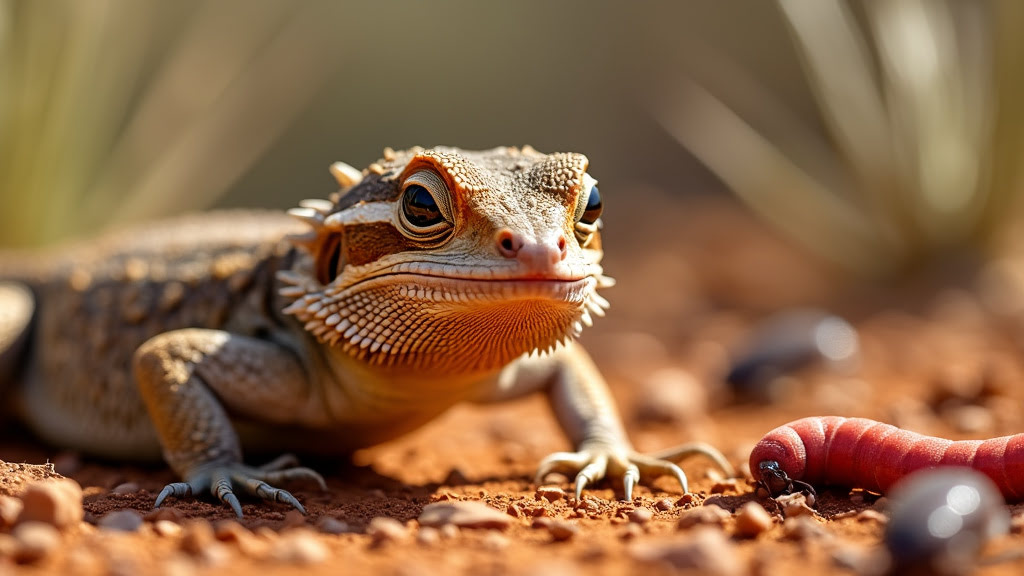Feeding Time at Dug’s Bugs is always exciting. Just last week, I saw my little scaly friend Fred nibbling on a new treat—a redworm. His surprised look was amazing and it got me thinking: can bearded dragons eat redworms? And if they can, are they good for them? Let’s find out together what feeding redworms to our bearded dragons is like.
Understanding Bearded Dragon Diets
Natural Diet in the Wild
In the wild, bearded dragons eat a lot of different things. These desert creatures munch on insects, plants, and sometimes even small animals. Imagine them wandering around the Australian outback, catching cool bugs and munching on leafy greens. It’s like a buffet for them out there!
Diet in Captivity
When they are pets, their diet still needs to be varied and balanced. A good diet for a bearded dragon includes insects, vegetables, and sometimes fruits. Most bearded dragons like trying different foods, much like kids at a dessert buffet. However, it’s important to make sure their diet is healthy and prevents any nutritional problems.
Nutritional Profile of Redworms
What Are Redworms?
Redworms, also known as earthworms, are part of the lumbricidae family. These little wrigglers are packed with nutrients and are a great source of protein and fat. They are like a natural multivitamin for your bearded dragon!
Comparing Redworms to Other Feeder Insects
When compared to other insects like crickets and mealworms, redworms are different. Here’s a quick comparison:
- Crickets: High in protein, easy to digest, but noisy and jumpy.
- Mealworms: Moderate in protein, higher in fat, hard to digest because of their exoskeleton.
- Redworms: High in protein, moderate in fat, easy to digest because they have soft bodies.
Each insect has its pros and cons, but redworms are great because they are easy to digest and full of nutrients. However, they should be part of a varied diet and not the only food your dragon eats.
Feeding Redworms to Your Bearded Dragon
Are Redworms Safe?
Feeding redworms to your bearded dragon is usually safe, but you need to be careful. The main concern is where you get the redworms from. Make sure you’re getting them from good suppliers like Dug’s Bugs to avoid any contaminants or pesticides. A clean worm means a happy dragon!
How to Introduce Redworms
Introducing redworms to your dragon’s diet can be fun. Here’s a simple guide:
- Start Small: Give a few redworms first to see if your dragon likes them.
- Observe: Watch how your dragon reacts and digests the worms over the next day.
- Gradual Increase: If all goes well, slowly give more redworms in the next few feedings.
- Mix It Up: Add redworms along with other insects and vegetables for a balanced diet.
Remember, variety is good—even for bearded dragons!
Balancing the Diet
Dietary Diversity
It’s important to have a diverse diet. Along with redworms, include other insects like crickets, mealworms, and dubia roaches. Also, don’t forget the greens! Leafy vegetables like collard greens, mustard greens, and dandelion greens should be a big part of their diet. Sometimes, fruits can be given as a treat.
Common Feeding Mistakes
Even experienced owners can make mistakes. Here are some common mistakes to avoid:
- Too Much Protein: Too much protein can cause kidney problems.
- Not Enough Greens: Vegetables should make up about 80% of an adult dragon’s diet.
- No Supplements: Without calcium and vitamin D3 supplements, dragons can get metabolic bone disease.
Watch for signs of nutritional problems like tiredness, swollen joints, or no appetite, and change their diet if needed.
Health Considerations
Monitoring Health
When you add redworms to your dragon’s diet, keep an eye on their health. Always watch their appetite, weight, and activity levels. Look for any signs of allergies or digestive problems like diarrhea or bloating. If you see anything strange, try giving them fewer redworms for a while.
When to See a Vet
If you have any worries about your bearded dragon’s diet or health, see a vet. Regular check-ups can spot problems early and give you peace of mind. A vet can give you advice to keep your dragon healthy.
Conclusion
To sum it up, redworms can be a healthy and nutritious part of your bearded dragon’s diet if you get them from good suppliers like Dug’s Bugs and feed them in moderation. Balance is key, so make sure your dragon gets a varied diet with different insects, vegetables, and the right supplements. My experience with Fred and redworms has been great. He loves his redworm treats, and his health has improved.
If you want to add redworms to your bearded dragon’s diet, talk to an exotic pet vet first to get advice for your dragon’s needs. Feel free to share your experiences or ask questions in the comments below. Happy feeding!
Additional Resources
- Reputable Suppliers: Always buy from trusted sources to ensure the health and safety of your pet.
- Recommended Reading: Stay informed with articles on bearded dragon care and nutrition.
- FAQs Section: Got questions? Check out our FAQs for more information on feeding and caring for your bearded dragon.

